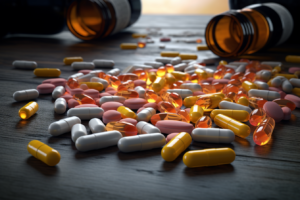Introduction to Phosphatidylserine (PS)
Introduction to Phosphatidylserine (PS): Phosphatidylserine (PS) is a phospholipid found in the cell membrane of all human cells. It is a popular supplement used in sports nutrition to improve sports performance, reduce muscle soreness, and reduce cortisol response to exercise-induced stress. The International Society of Sports Nutrition recommends PS supplementation for athletes to help combat exercise-induced stress and prevent the physiological deterioration that can accompany too much exercise.
Studies have shown that PS supplementation can improve performance, reduce muscle damage, and speed up recovery. In a study published in the Journal of the International Society of Sports Nutrition, active male athletes were given a soy-derived phosphatidylserine complex or a placebo for 10 days. The results showed that PS supplementation had a positive effect on exercise time to exhaustion, compared to the placebo group. Additionally, PS supplementation was found to reduce markers of muscle damage and prevent muscle soreness following exercise. This suggests that PS supplementation can be an effective supplement for combating exercise-induced stress and preventing the physiological deterioration that can accompany too much exercise.
PS Supplementation and Sports Injury Recovery
PS supplementation has been shown to possess ergogenic properties and has been used to improve sprint and exercise performances in athletes involved in cycling, weight training and endurance running. Studies have shown that PS supplementation can help to reduce cortisol concentrations and increase testosterone to cortisol ratio, compared to placebo. This can help to achieve the desired hormonal status for athletes by blunting increases in cortisol production and secretion in response to exercise after 10 days of taking PS.

In a study conducted by the American College of Sports Medicine, samples were assessed for cortisol and testosterone levels before and after a moderate intensity exercise protocol on a cycle ergometer. It was found that PS supplementation was able to reduce peak cortisol concentrations and blunting increases in cortisol, compared to placebo.
Furthermore, PS supplementation was also able to increase testosterone levels and improve recovery of muscle glycogen following exercise, compared to passive recovery. This suggests that PS supplementation can help to lower cortisol and improve the perceptive effects of phosphatidylserine administration during two weeks of taking phosphatidylserine for 10 days.
Investigating the Effects of PS Supplementation
Investigating the effects of PS supplementation has been a hot topic in recent years. It’s been found that taking a dosage of phosphatidylserine (PS) can have a positive effect on emotional, hormonal and perceptive responses. PS is a phospholipid found in cell membranes, and is made up of phosphatidic acid and phosphatidylserine complex. It’s been shown that taking phosphatidylserine supplements can help to increase phosphatidylserine levels in the body, which can help to reduce fat, improve attention deficit hyperactivity disorder (ADHD) and reduce the effects of chronic overtraining often seen in athletes.
Studies have also shown that taking milligrams of phosphatidylserine can help to increase exercise performance, as well as reduce cortisol secretion. In one study, it was found that adding phosphatidylserine to a soy lecithin and phosphatidic acid and phosphatidylserine complex had positive effects on serum ACTH and cortisol levels. This suggests that taking PS supplementation can help to reduce cortisol levels, which can help to increase testosterone levels and reduce the negative responses to staged cycling exercise. All in all, it’s clear that taking enough phosphatidylserine can have positive effects on hormonal, emotional and perceptive responses, and can help to signal increased performance.
Effects of PS on Testosterone Levels
It’s no secret that phosphatidylserine (PS) has been shown to have some pretty impressive effects on testosterone levels. Studies have shown that supplementation with PS can help to increase testosterone levels and decrease cortisol levels, resulting in improved performance and higher testosterone levels.
Lecithin phosphatidic acid and phosphatidylserine are two of the main components of PS, and both have been shown to have hormonal and perceptive effects. Studies have also shown that phosphatidylserine helps to reduce cortisol levels, which can lead to higher testosterone levels. Additionally, research has shown that supplementation with PS can also help to reduce cortisol levels, which can lead to decreased performance and lower testosterone levels. All in all, the effects of s-PS on testosterone levels are clear, and it’s clear that supplementation with PS can help to increase testosterone levels and reduce cortisol levels.
Effects of PS on Plasma Concentrations of Cortisol
Wow, phosphatidylserine has been shown to have a huge effect on cortisol levels! It’s a lecithin phosphatidic acid and phosphatidylserine, and it’s been found to increase cortisol levels when taken as a supplement. This is a big deal, because high cortisol levels can have a negative impact on your health.

Studies have shown that when cortisol levels are increased, testosterone levels fall, which can lead to a decrease in energy and motivation. So, if you’re looking to keep your cortisol levels in check, it’s important to consider supplementing with phosphatidylserine. It’s been shown to be effective in reducing cortisol levels, and it could be just the thing you need to keep your hormones in balance.
Conclusion
In conclusion, it is clear that supplementation can have a positive effect on testosterone levels and cortisol levels. Supplementation can increase testosterone levels, which can lead to improved physical performance, increased muscle mass, and improved libido. Supplementation can also help to reduce cortisol levels, which can lead to improved stress management and improved sleep quality. However, it is important to note that supplementation should be done in moderation and with the guidance of a healthcare professional. Additionally, it is important to note that supplementation should not be used as a substitute for a healthy lifestyle, which includes a balanced diet and regular exercise. Ultimately, supplementation can be a beneficial tool for improving testosterone and cortisol levels, but it should be used in conjunction with a healthy lifestyle for optimal results.

FAQ’s:
Q1. Does phosphatidylserine help with sports injury recovery?
A1. Yes, phosphatidylserine has been shown to help with sports injury recovery.
Q2. What are the benefits of phosphatidylserine for athletes?
A2. Phosphatidylserine has been shown to help reduce inflammation, improve muscle recovery, and increase testosterone levels in athletes.
Q3. Does phosphatidylserine supplementation reduce cortisol levels?
A3. Yes, phosphatidylserine supplementation has been shown to reduce cortisol levels in athletes.
Q4. How much phosphatidylserine should athletes take?
A4. The recommended dosage of phosphatidylserine for athletes is 300-600mg per day.
Q5. What are the side effects of phosphatidylserine?
A5. The most common side effects of phosphatidylserine are nausea, headache, and insomnia.
Q6. Is phosphatidylserine safe for athletes?
A6. Yes, phosphatidylserine is generally considered safe for athletes when taken in recommended doses.
Q7. Does phosphatidylserine help with muscle soreness?
A7. Yes, phosphatidylserine has been shown to help reduce muscle soreness in athletes.



 Phosphatidylserine And Cardiovascular Health
Phosphatidylserine And Cardiovascular Health
